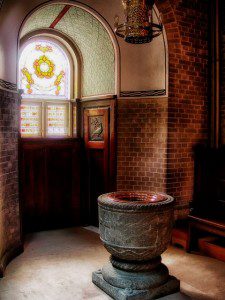Fifth in a series of posts on Luther, Lutherans, and calling by Lutheran pastor Adam Roe with responses over at Cranach by Gene Veith. See the whole series at the bottom of this post. They’ll appear from time to time in this space for the next couple of weeks. Enjoy!
 Lest one imagine that the priesthood of all believers is merely an academic topic for Lutherans, we need only to compare Protestant conceptions of the state of the medieval church with the church that we observe in the Book of Acts. Luther remarked in his introduction to the Small Catechism that “The common people, especially in the villages, have no knowledge whatever of Christian doctrine, and, alas! many pastors are altogether incapable and incompetent to teach [so much so, that one is ashamed to speak of it].”
Lest one imagine that the priesthood of all believers is merely an academic topic for Lutherans, we need only to compare Protestant conceptions of the state of the medieval church with the church that we observe in the Book of Acts. Luther remarked in his introduction to the Small Catechism that “The common people, especially in the villages, have no knowledge whatever of Christian doctrine, and, alas! many pastors are altogether incapable and incompetent to teach [so much so, that one is ashamed to speak of it].”
One can see in this scenario two problems. First, because the priesthood had been reduced to a role of Levitical mediation, some priests had begun to view their role as elevated in an ex opere operato manner. The priesthood was important because of the daily sacrifices lifted. Much like receiving the Eucharist was viewed as being efficacious simply from the fact of receiving it, the theology of vocation in the medieval church allowed priests to view themselves more as sacrificial functionaries than as teachers of the Gospel. As such, it was not uncommon for Luther to find that priests had very little knowledge.
Similarly, because many priests were not theologically informed, many of the laity were not theologically informed. The view that priests performed the necessary religious functions did not necessarily lead to laxity in devotion, but it kept the laity from being as engaged in church life as might have otherwise been the case. The laity might observe, and would have had exposure to the read Word (though not always in the vernacular!), but they could not hope to aspire to the practice of holiness, either within or outside the church because their functions were not of ultimate value. Ultimate value was defined in the number of sacrifices offered on behalf of the congregation and for those unfortunate souls who needed sacrificial merits to be sprung from purgatorial suffering. The people who were charged with such a ministry were, therefore, considered of utmost importance in service to the church. The laity might observe and support this role, but they could play no part in what was perceived as this most important work.
Theology aside, one must ask if such a reality is not similar to what the church has become today. Though Protestant churches would, on the whole, reject any theology that views the pastor as a mediator of God’s forgiveness, the focus of the pastor as an elevated office can hardly be denied in many churches. In such views, the pastor becomes the hub of all church life, and the laity views itself as offering very little of spiritual value. Compare such visions with the picture we get of “church”in the early portions of the Book of Acts. In Acts 2 we read:
So those who received his word were baptized, and there were added that day about three thousand souls.And they devoted themselves to the apostles’ teaching and the fellowship, to the breaking of bread and the prayers. And awe came upon every soul, and many wonders and signs were being done through the apostles. And all who believed were together and had all things in common. And they were selling their possessions and belongings and distributing the proceeds to all, as any had need. And day by day, attending the temple together and breaking bread in their homes, they received their food with glad and generous hearts, praising God and having favor with all the people. And the Lord added to their number day by day those who were being saved.
One cannot help but notice that this was a community in which every person was in ministry! To be a saved and added to the community of believers was to immediately enter into the community of teaching, fellowship, Eucharist, missions, worship, prayer, praise, and evangelism. However one may interpret the theological implications of the medieval church, the Lutheran focus on vocation was an attempt to restore the church to that first century vitality; a return in which every person among the assembled had an important role to play both within the congregation, and outside the congregation.
 Adam Roe is the pastor of New Life Lutheran Church in Sterling, IL.
Adam Roe is the pastor of New Life Lutheran Church in Sterling, IL.
Previous posts in this series:
- God is in all of life
- No super-Christians
- God is abundantly everywhere
- The sacrifice to which all Christians are called












